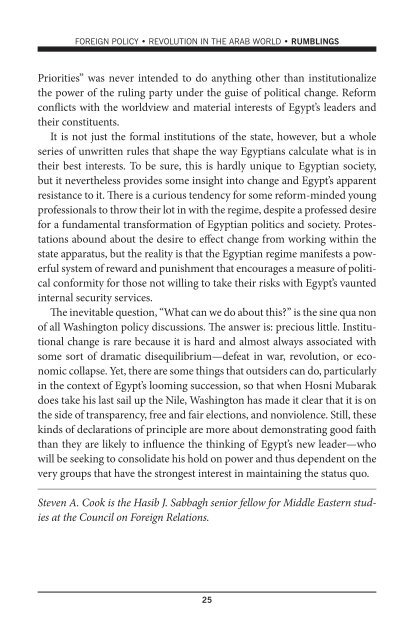Revolution in the Arab World - Observation of a lost soul Blog
Revolution in the Arab World - Observation of a lost soul Blog
Revolution in the Arab World - Observation of a lost soul Blog
Create successful ePaper yourself
Turn your PDF publications into a flip-book with our unique Google optimized e-Paper software.
foreign policy • revolution <strong>in</strong> <strong>the</strong> arab world • rumbl<strong>in</strong>gs<br />
Priorities” was never <strong>in</strong>tended to do anyth<strong>in</strong>g o<strong>the</strong>r than <strong>in</strong>stitutionalize<br />
<strong>the</strong> power <strong>of</strong> <strong>the</strong> rul<strong>in</strong>g party under <strong>the</strong> guise <strong>of</strong> political change. Reform<br />
conflicts with <strong>the</strong> worldview and material <strong>in</strong>terests <strong>of</strong> Egypt’s leaders and<br />
<strong>the</strong>ir constituents.<br />
It is not just <strong>the</strong> formal <strong>in</strong>stitutions <strong>of</strong> <strong>the</strong> state, however, but a whole<br />
series <strong>of</strong> unwritten rules that shape <strong>the</strong> way Egyptians calculate what is <strong>in</strong><br />
<strong>the</strong>ir best <strong>in</strong>terests. To be sure, this is hardly unique to Egyptian society,<br />
but it never<strong>the</strong>less provides some <strong>in</strong>sight <strong>in</strong>to change and Egypt’s apparent<br />
resistance to it. There is a curious tendency for some reform-m<strong>in</strong>ded young<br />
pr<strong>of</strong>essionals to throw <strong>the</strong>ir lot <strong>in</strong> with <strong>the</strong> regime, despite a pr<strong>of</strong>essed desire<br />
for a fundamental transformation <strong>of</strong> Egyptian politics and society. Protestations<br />
abound about <strong>the</strong> desire to effect change from work<strong>in</strong>g with<strong>in</strong> <strong>the</strong><br />
state apparatus, but <strong>the</strong> reality is that <strong>the</strong> Egyptian regime manifests a powerful<br />
system <strong>of</strong> reward and punishment that encourages a measure <strong>of</strong> political<br />
conformity for those not will<strong>in</strong>g to take <strong>the</strong>ir risks with Egypt’s vaunted<br />
<strong>in</strong>ternal security services.<br />
The <strong>in</strong>evitable question, “What can we do about this” is <strong>the</strong> s<strong>in</strong>e qua non<br />
<strong>of</strong> all Wash<strong>in</strong>gton policy discussions. The answer is: precious little. Institutional<br />
change is rare because it is hard and almost always associated with<br />
some sort <strong>of</strong> dramatic disequilibrium—defeat <strong>in</strong> war, revolution, or economic<br />
collapse. Yet, <strong>the</strong>re are some th<strong>in</strong>gs that outsiders can do, particularly<br />
<strong>in</strong> <strong>the</strong> context <strong>of</strong> Egypt’s loom<strong>in</strong>g succession, so that when Hosni Mubarak<br />
does take his last sail up <strong>the</strong> Nile, Wash<strong>in</strong>gton has made it clear that it is on<br />
<strong>the</strong> side <strong>of</strong> transparency, free and fair elections, and nonviolence. Still, <strong>the</strong>se<br />
k<strong>in</strong>ds <strong>of</strong> declarations <strong>of</strong> pr<strong>in</strong>ciple are more about demonstrat<strong>in</strong>g good faith<br />
than <strong>the</strong>y are likely to <strong>in</strong>fluence <strong>the</strong> th<strong>in</strong>k<strong>in</strong>g <strong>of</strong> Egypt’s new leader—who<br />
will be seek<strong>in</strong>g to consolidate his hold on power and thus dependent on <strong>the</strong><br />
very groups that have <strong>the</strong> strongest <strong>in</strong>terest <strong>in</strong> ma<strong>in</strong>ta<strong>in</strong><strong>in</strong>g <strong>the</strong> status quo.<br />
Steven A. Cook is <strong>the</strong> Hasib J. Sabbagh senior fellow for Middle Eastern studies<br />
at <strong>the</strong> Council on Foreign Relations.<br />
25




